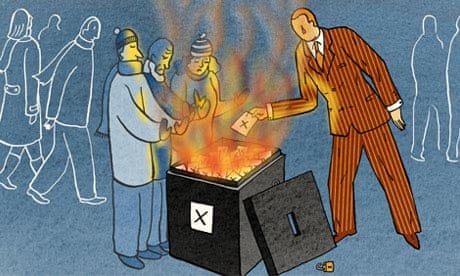Are we all doomed? America's fiscal democracy this week collapsed in disarray. The Arab spring ran out of steam. Emergency regimes have taken power in Greece and Italy, while Germany could not sell a third of its bonds. Salvation, according to Europe's desperate "leader", José Manuel Barroso, can only lie in "stronger governance in the euro area, both in discipline and in convergence". He wants nation states to submit draft budgets of their taxing and spending to him for oversight, to be subject to Brussels' "enhanced surveillance".
This is more than alarming. Today's European crisis was brought about by widespread popular revolt against the straitjacket of an unrealistic European monetary union. Barroso's solution is apparently an even tighter straitjacket, and no nonsense about popular elections or national referendums. He wants Europe ruled by Aristotle's aristocrats, by people like him.
We know what smart politics says. Yes, we have been here before, in the 1900s and the 1930s, but then we were led by donkeys and drifted into war. There have been blips since then, in the 1970s and 1990s, but we survived. As the Economist magazine loftily commented this month of the present wreckage, "the EU … will muddle through … Europe will breathe a sigh of relief and continue down the path of genteel decline".
I have long been of this Micawberish persuasion but I am starting to have my doubts. The ideology of the 1990s was of "democratic inevitability" – Francis Fukuyama's destination of history. It seduced western governments into massive deficit financing, into inflating their housing markets and courting votes with ever more borrowing and spending. In the US this has concluded in a constitutional crisis, as a congressional super-committee fails to resolve the country's indebtedness. The same ideology led US and British troops into neoconservative wars to "promote freedom" at the point of a gun across the Muslim world. It fuelled the ambition of a new generation of urban Arabs to rise up against authoritarian regimes, many to dissolve into renewed conflict. Democracy is everywhere in tears (except, dare I say it, in South America).
Who is laughing? Dictatorial China, while Europe grovels for money at its feet. Moscow's oligarchs, just two decades after suffering the greatest humiliation in Russian history. Laughing too are the kleptocrats of Africa and Asia. So are Europe's unelected patricians as they slide effortlessly into the seats of power, handing down daily bromides and diktats to the miserable helots of Euro-democracy.
Any competent observer can conjure some hope from this mess. Perhaps the Greek and Italian regimes are merely facilitators, to correct past mistakes and push through austerity measures before reverting to national elections. Perhaps their debts, like those of Spain and others, can be rescheduled and met. Perhaps the EU needs only to click into a new gear, with new disciplines under the benign guidance of a bountiful Germany. Perhaps the US will retrench budgetarily under a re-elected Obama administration.
That is what happened in the 1970s, when grim commentators wondered if "stagflation" might spell the end of democracy. Then, a series of Times articles wondered if electors would ever vote for the discipline necessary to escape the politics of tax, borrow and spend. Would social democracy not have to give way to oligarchy? The answer was no. People voted not just for Margaret Thatcher but for conservative governments in the US and elsewhere in Europe.
The 1970s are not today. Under the credit bubble, European electorates have voted for one spendthrift government after another and built up stupefying debts. When they were told to repent and accept austerity, they voted those governments out. The US, so often lauded as a successful "fiscal union", saw Republicans plunge new depths of economic mismanagement, with reckless tax cuts and wars. Today's predicament is unquestionably worse than the 1970s.
Democracy is supposedly a self-correcting mechanism. The US historian Arthur Schlesinger used to reassure audiences that the US constitution always took the republic to the brink of disaster, but hauled it back at the last minute. This thesis is now being tested to destruction. American democracy is in the grip of lawyers and lobbyists. Britain's genius for consensus could not curb Gordon Brown's Neronian Treasury. It was the same across Europe. Electorates goaded politicians to promise ever more. Some preached prudence but none practised it.
The present eulogising of technocracy, of the power of economic technique unsullied by the mob, has always been the harbinger of dictatorship. We should remember how many Britons admired the efficiency of 1930s Germany and lauded Mussolini's trains running on time. Then, too, it was thought unimaginable that Europe would ever go to war. Who until recently thought that British soldiers would die in their hundreds for "regime change" in Iraq and Afghanistan, or that Whitehall would be preparing for war with Iran?
Greece is now talking of a "German protectorate". The technocrat Italian prime minister, Mario Monti, warns his people that "the management of the crisis has suffered from a deficiency of government, and must be overcome with action at a European level". We need not reproduce the Greek magazine's cover of a swastika on the Acropolis to shudder at the phrases "deficiency of government" and "action at a European level". We heard those phrases before.
Consider the euphemisms. Barroso stamps on a possible Greek referendum as "a breach of trust". In whom? The new German hegemony (which many Germans are commendably resisting) is called "enhanced co-operation". Even a Guardian headline takes as axiomatic that a two-speed Europe is to be "feared". Fast is synonymous with euro membership, German discipline, technocracy and progress; slow with a "peripheral", populist democracy.
Ten years ago, a Norwegian government study on the future of democracy warned that it was not an inevitable state of government. It could default into oligarchy as easily in Oslo, Moscow or London as it did in ancient Greece. Rule of the people by the people for the people needs to be guarded and constantly refreshed. It withers first at the local level, as in Britain after a generation of centralism. This narrows and clogs access to the seat of power, restricting it to a class of technocratic professionals in cahoots with big money. It happened in interwar Germany. It is happening now in Washington and the upper echelons of most European governments.
Pessimism always has the best tunes, and I remain instinctively an optimist. I still cheer when I see democracy's shrivelled hordes assert themselves in the street. My brain may be with technocracy, but my heart is with the majority, hoping that the two can resume consummation. But we should remember Schumpeter's warning, of capitalism's tendency to self-destruction and socialism's to fascism. Both, he said, were history's "jokes of questionable taste".
Perhaps we shall still muddle through. But it will not be by jeering at democratic institutions or blandly awarding power to unaccountable oligarchs. That way democracy really will find itself at the wrong end of a rubber bullet.

